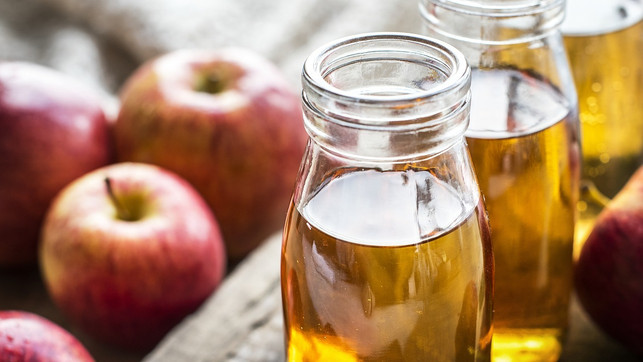
Too much stomach acid in the esophagus leads to heartburn and, in the worst case, chronic symptoms. We will explain the causes and show you how you can take action against the acid.
Too much stomach acid plagues many people. Stomach acid plays an important role in digestion by helping to break down food and kill microorganisms such as bacteria. It also activates enzymes that are responsible for the digestion of proteins and fats.
When healthy, our stomach’s mucous membrane is equipped to withstand acid. Our esophagus, however, has no such protection. If the connection between the stomach and the esophagus is disturbed, stomach acid can get into the esophagus and trigger heartburn or the so-called “reflux disease”. This is a widespread disease that affects around 10 percent of Germans. The disease manifests itself through symptoms such as a feeling of fullness, pressure in the abdomen, hoarseness and a burning sensation in the esophagus that can travel down to the throat. There are many reasons for this, most of which have to do with your lifestyle and diet.
Note: Sometimes too much stomach acid can be caused by a bacterial infection or a more serious illness. If you are unsure, you should definitely seek medical advice to rule out that a serious illness is the cause of the burning sensation in your stomach or throat.
If your symptoms don’t have a serious cause, you can use simple home remedies to combat them. You can find out more about this at the end of the article.
Unhealthy lifestyle as a cause

(Photo: CC0 / Pixabay / Free Photos)
The main cause of too much stomach acid for most people is their unhealthy lifestyle. People who eat unhealthy diets are most likely to suffer from heartburn and reflux. But other factors can also influence your stomach acid:
- Too much alcohol
- nicotine
- Too much tea containing coffee/tea
- Carbonated drinks
- stress
- Painkillers
In most cases, the cause of too much stomach acid is an interaction of the factors mentioned above. People who suffer from a lot of stress are also more likely to turn to cigarettes, alcohol and fast food. Alcohol and nicotine have been shown to reduce the pressure of the sphincter in the esophagus, allowing stomach acid to rise more easily.
You can find out how you can reduce stress in this article: Reduce stress: 7 tips on how to slow down your life
Stress, alcohol and nicotine often lead to headaches and migraines, which are often treated with aspirin. However, aspirin, with its active ingredient acetylsalicylic acid, can easily cause inflammation of the stomach lining. Other painkillers such as ibuprofen, diclofenac (Voltaren) or cortisone can also cause inflammation of the gastric mucosa.
Of course, that doesn’t mean that you should “just endure” the pain. Try to look for the real cause (Are you tense? Tired? Is it a PMS symptom?). In acute cases, you can also relieve headaches with natural home remedies.
Diseases as a cause of too much stomach acid

(Photo: CC0 / Pixabay / silviarita)
Too much stomach acid can be a symptom of some diseases. A common cause is a bacteria called Helicobacter pylori, which can cause painful inflammation of the stomach lining (gastritis). A gastroscopy can be used to determine whether the bacterium is present. If so, it is important that the bacteria is treated, otherwise in the worst case it can lead to stomach cancer.
The following diseases can be the cause of too much stomach acid:
- Gastritis (inflammation of the stomach lining)
-
Irritable bowel syndrome/irritable stomach
- Food intolerances (e.g. celiac disease)
- Barrett’s esophagus
- Zollinger-Ellison syndrome
- Stomach ulcer
- Stomach cancer
If you suffer from constant stomach acid or heartburn, be sure to seek medical advice. Correcting the problem is very important because it can arise from or lead to a serious illness – including esophageal cancer.
Many people who suffer from too much stomach acid often turn to acid blockers such as proton pump inhibitors (PPIs), which reduce acid production in the stomach and can help relieve the symptoms in the short term. But in the long term, these drugs can cause more harm. Although many stomach protectants are available without a prescription, they should not be taken for more than two weeks at a time. Because stomach acid plays an important role in the body: it kills bacteria and other pathogens. If stomach acid is permanently and severely reduced, this protective function can be impaired. The pathogens then survive the stomach passage and increase the risk of intestinal problems.
Proton pump inhibitors can cause vitamin B12 and iron deficiencies when used long-term because stomach acid plays an important role in the absorption of these nutrients from food. There is also evidence that the risk of bone fractures increases because reduced stomach acid reduces the absorption of calcium, an important building block for bones. Long-term use should only be carried out in certain cases and under medical supervision.
The right nutrition

(Photo: CC0 / Pixabay / eKokki)
When there is too much stomach acid, many people turn to carbohydrate-containing foods, as “dry” food is intuitively supposed to absorb the acid. But this can often be counterproductive and make your symptoms worse. A diet high in carbohydrates overloads the digestive tract and has been shown to cause more acid reflux. Since the majority of these foods cannot be used, bacteria are created in the intestines during processing. This causes gas to be produced, which puts pressure on the upper digestive tract. This makes it easier for stomach acid to rise.
A so-called “low-carb” diet has been proven to reduce excess stomach acid and reflux. You don’t have to give up carbohydrates completely, but try to reduce their proportion in your diet.
On Techzle\.com you will find some low-carb recipes that can make changing your diet easier: Low-carb recipes: These 5 simple ideas with regional ingredients are guaranteed to be a success
Other foods that can cause too much stomach acid:
- Spicy or spicy foods
- Fruit with a high fructose content (such as apples or pears)
- Some fats, such as easily oxidizing oils (rapeseed oil, sunflower oil, soybean oil) and fried fats, have been shown to cause inflammation in the gastrointestinal tract
You can reduce stomach acid with these foods and eating habits:
-
Protein-rich foods, such as eggs or fish. Proteins stimulate muscle tension to close the esophageal sphincter and thus prevent stomach acid from rising.
-
Bitter substances promote digestion and thus relieve your stomach.
- Fermented foods improve your intestinal flora (such as sauerkraut).
-
Chew thoroughly and eat slowly: The more you process your food in your mouth, the less your stomach has to do.
-
Smaller and easily digestible meals in the evening: When you sleep, your body should be busy recovering. However, when your stomach is full, it still has to work harder to digest food. This not only reduces your sleep quality but also causes heartburn.
Home remedies for too much stomach acid

(Photo: CC0 / Pixabay / rawpixel)
If the pain is acute, you need quick emergency home remedies. Too much stomach acid can be reduced in the long term through a healthy diet, but if you have acute symptoms, these methods can help you:
-
Apple cider vinegar: vinegar against too much acid? Sounds counterintuitive, but it helps. To do this, add a shot of high-quality apple cider vinegar to a glass of water and drink it slowly to neutralize stomach acid. Use a straw (for example made of glass) because the acid from the apple cider vinegar can attack your teeth. Attention: If you don’t have apple cider vinegar in the house, don’t use standard household vinegar. This is too concentrated and can be extremely irritating to your stomach.
-
Gold linseed: Take a spoonful of high-quality gold linseed and soak it in around 150 milliliters of water. It’s best to pour boiling water over them and stir until a “slime” forms. This can protect the stomach lining walls.
-
Healing clay and Bullrich salt (baking soda) can provide short-term relief as they bind the acid in the stomach. However, you shouldn’t use them long-term because the stomach tries to compensate for the loss of acid by producing more acid.
Read more on Techzle\.com:
- Home remedies for heartburn: What really helps
- Stomach-friendly food: Easily digestible food for the stomach
- Gastrointestinal: home remedies for the symptoms
- Oatmeal soup: recipe for the remedy for stomach problems
- Breakfast without carbohydrates: ideas for a low-carb breakfast
Edited by Melanie Grünauer
** marked with ** or orange underlined Links to sources of supply are partly partner links: If you buy here, you are actively supporting Techzle\.com, because we then receive a small part of the sales proceeds. More info.